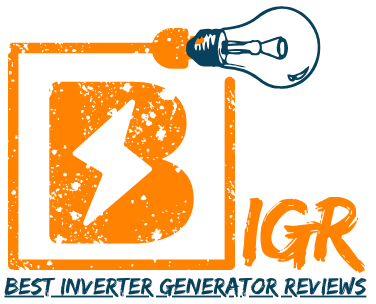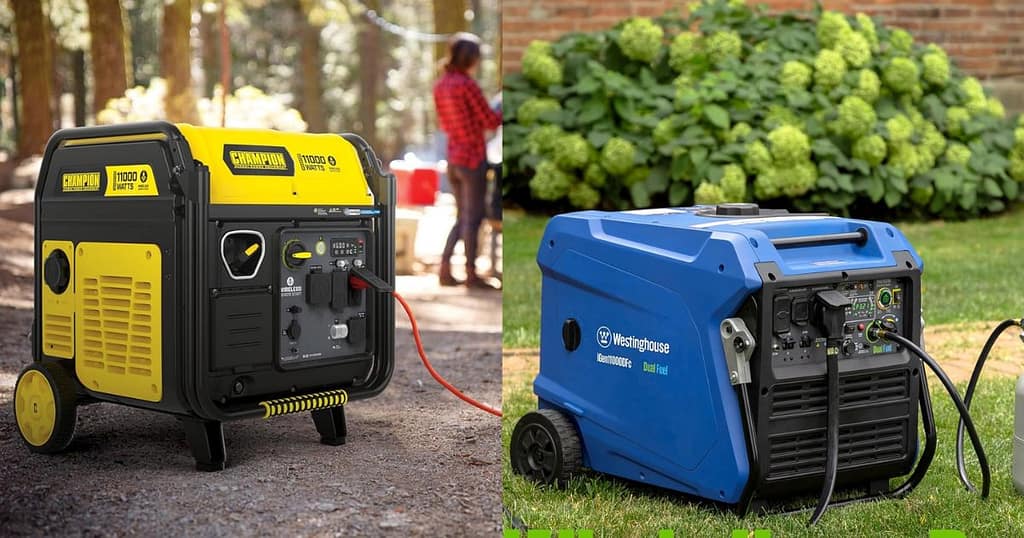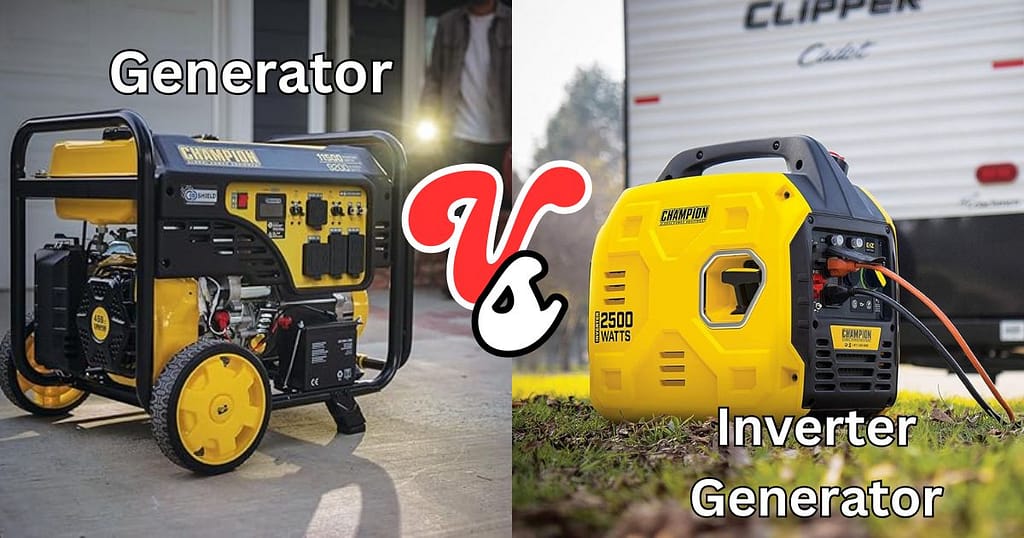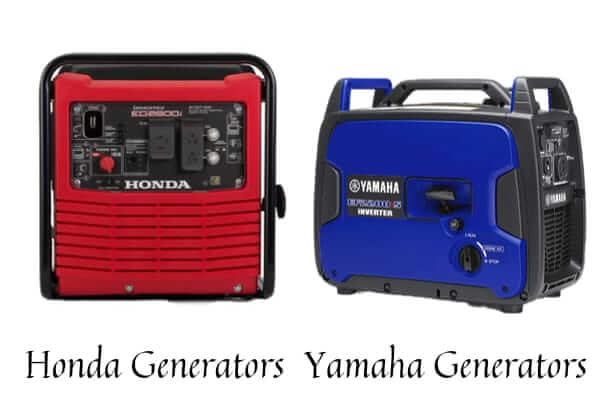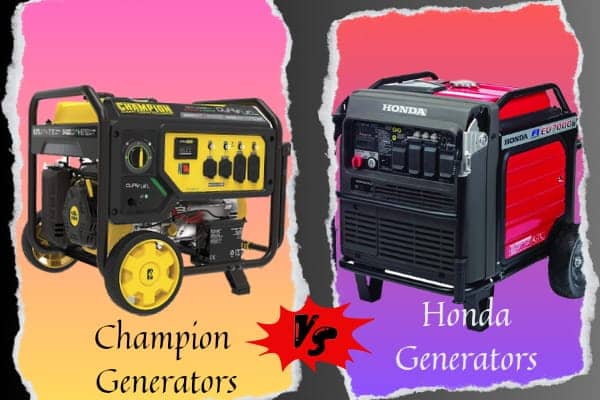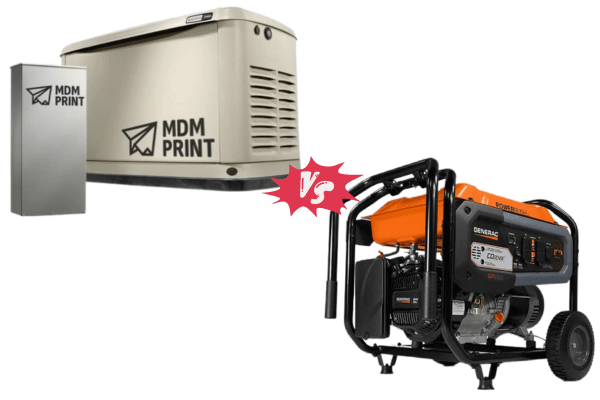When it comes to picking the right generator for your needs, both the Champion 11000-Watt Dual Fuel Generator and the Westinghouse iGen11000DFC stand out as solid options. However, each has its strengths, and the best one for you depends on what you’re looking for.
In this comparison, we’ll walk you through the key features of both models, from engine power to run time and control panels, so you can easily see which one fits your needs. By the end, you’ll have a clearer idea of which generator is the right choice for you.
Design & Build Quality
After using both the Champion 201417 and the Westinghouse iGen11000DFC, it’s clear they’re built for serious work—but with different personalities.
The Champion feels like a tank. At just over 205 lbs, it’s heavy but in a good way—solid and rugged. Its all-metal frame and powder-coated yellow-and-black finish hold up well against weather, dust, and bumps. The layout of the control panel is clean and intuitive, and the heavy-duty wheels and folding handle make moving it surprisingly easy for its size.
The Westinghouse takes a different approach. It’s enclosed in tough plastic that doesn’t feel cheap at all. It’s more compact, has a sleek matte blue finish, and overall looks more modern. It’s also quieter—especially on propane—and the fully enclosed design helps with both appearance and noise. The control panel is smartly laid out with a clear LCD screen, and the remote start is a great convenience feature.
In short, the Champion is built like a rugged workhorse, while the Westinghouse brings a more modern, refined feel with added tech and quiet performance. It comes down to whether you want old-school toughness or sleek, user-friendly design.
🏆 The Winner: Champion 11000-Watt Dual Fuel
The Champion 11000-Watt Dual Fuel wins in design and build quality. The rugged all-metal frame, durable finish, and sturdy construction lend it a solid, reliable feel. It’s built to withstand tough environments, whether it’s job sites, rough weather, or uneven ground. The thoughtful design, including easy-to-use handles and a well-organized control panel, further adds to its practical and long-lasting build. While the Westinghouse is well-built and sleek, the Champion feels like the more durable, heavy-duty choice for demanding conditions.
Powerful Engine
Both of these generators pack serious engines, but they each bring something a little different to the table.
The Champion 11000W comes with a tough 459cc OHV engine that feels like a muscle car under the hood. It starts quickly, runs smooth, and delivers consistent power even when I’m running multiple heavy tools at once. Whether it’s on a jobsite or during a power outage, this engine doesn’t flinch. It handles load changes like a pro, and the eco mode helps cut down noise and fuel use when I’m not maxing it out.
The Westinghouse iGen11000DFC has a slightly smaller 452cc OHV engine, but it still punches above its weight. It’s smooth, reliable, and the cast iron sleeve gives it long-term durability. I really like the built-in safety features—especially the automatic low oil shutoff and carbon monoxide sensor. It runs clean and quiet, and has held up great during long runtimes.
In short, the Champion brings raw muscle and worksite toughness, while the Westinghouse leans into smart safety features and quiet, dependable operation.
🏆 The Winner: Champion 11000-Watt Dual Fuel
For engine power and reliability, the Champion 11000-Watt Dual Fuel is the clear winner. Its 459cc OHV engine provides powerful, consistent performance even under heavy load, handling multiple tools or appliances at once with ease. The engine runs smoothly, doesn’t stutter under load, and has great fuel efficiency on both gasoline and propane. Additionally, its stable performance and ease of maintenance make it a standout. While the Westinghouse engine is reliable, the Champion’s engine feels like it’s built for tougher, more demanding conditions, giving it the edge.
Watts and Run time
When it comes to raw power and staying power, both of these generators absolutely bring it—but they do have their differences that might make one more suited for your setup than the other.
Let’s start with the Champion 11000-Watt Dual Fuel. This thing is a workhorse in the wattage department. On gasoline, it delivers 11,000 starting watts and 9,000 running watts, and you feel every bit of that muscle. I’ve powered multiple tools—table saw, miter saw, shop vac—all humming at the same time without a single hiccup. At home, I’ve kept the essentials running during a power outage: fridge, microwave, lights, a small AC unit. Didn’t even blink.
Switch over to propane, and yes, there’s a slight drop—11,000 starting watts and 8,100 running watts—but it still has more than enough muscle for most home or work scenarios. Propane is ideal for light to medium tasks—plus, you get extended runtime without stressing about fuel going bad.
Now let’s talk runtime, and this is where the Champion really earns its keep. With a 6-gallon tank, I’m regularly getting about 15 hours at 25% load on gasoline. That’s an entire workday or a full night of backup power with no interruptions. On a standard 20-lb propane tank, I get roughly 8 hours at the same load, which is still pretty solid. The included 6.5-foot propane hose with a built-in regulator is a nice touch too—everything connects smoothly, no extra parts or guesswork needed.
Then there’s the Westinghouse iGen11000DFC, and wow—this thing isn’t just about power, it’s about efficiency. This generator matches the Champion’s performance, putting out 11,000 starting watts and 9,000 running watts on gasoline. When you run it on propane, you get 10,000 watts for startup and 8,100 watts for continuous power. So wattage-wise, they’re neck and neck.
What really surprised me is just how clean the power is—less than 3% THD, which means I can plug in my laptop, router, and even my TV without flinching. I’ve tested it, and no flickers, no weird buzzing, just clean, consistent electricity like it’s coming straight from the grid.
As for runtime, the Westinghouse edges out the Champion slightly. On gasoline, I’ve gotten up to 17 hours at 25% load, which is a game-changer during extended outages or long off-grid use. Even propane gets me nearly 10 hours on a standard tank—super impressive for the output. The eco mode is really efficient too. If I’m only running a fridge and a few lights, I feel like I’m barely sipping fuel.
🏆 The Winner: Westinghouse iGen11000DFC
The Westinghouse iGen11000DFC wins in wattages and runtime. Although both generators offer impressive power, the Westinghouse delivers a slightly longer runtime, especially on gasoline, with up to 17 hours at 25% load compared to the Champion’s 15 hours. On propane, it also runs for 9.8 hours at 25% load, giving it an edge in efficiency. The power output is comparable, but the Westinghouse’s clean power (less than 3% THD) and better fuel efficiency give it a clear advantage for longer, more reliable performance.
Control Panel Comparison
The control panel on the Champion 11000-Watt dual fuel generator is simple and well-organized. Everything you need is right there—fuel selector, ignition switch, and choke—all laid out in a way that makes sense. The Intelligauge display is especially helpful, showing you important info like voltage, frequency, and total run time. It has multiple outlets, including standard 120V household plugs, a 30-amp outlet, and a 50-amp outlet for bigger jobs or RV use. Each outlet has its own breaker, which makes it safer and easier to manage. The panel feels sturdy, easy to use with gloves, and built for real-world use.
The Westinghouse iGen11000DFC, on the other hand, feels a bit more modern and feature-packed. The layout is clean and intuitive, with a digital display that gives you live readings on voltage, frequency, load, fuel level, and more. Starting is simple with the push-button electric ignition, and the remote start feature adds serious convenience—especially when the weather turns rough. It includes a strong variety of outlet types and even has ports for parallel operation if you want to connect another generator. There’s also an eco mode button to save fuel, and it’s Smart Switch ready, which is handy for home backup setups. Plus, the carbon monoxide sensor adds an extra layer of safety.
🏆 The Winner: Westinghouse iGen11000DFC
While the Champion 11000 has a solid and practical control panel, the Westinghouse iGen11000DFC pulls ahead with more modern features like a digital data center, remote start, eco mode, Smart Switch compatibility, and a cleaner layout overall. It’s easier to use, gives more real-time info, and adds convenience—especially for home backup or RV use.
Safety Features Comparison
The Champion 11000-Watt Dual Fuel generator covers the basics well. It has a built-in low oil shutoff, which means the engine will automatically shut down if oil levels drop too low—this helps prevent long-term damage. It also includes circuit breakers for each outlet, so if there’s an overload, the power gets cut off safely without affecting the whole generator. You won’t find fancy extras here, but everything that matters works rock-solid to protect your generator in tough situations.
The Westinghouse iGen11000DFC takes things a step further. It also includes low oil shutdown and individual circuit protection, but it adds a carbon monoxide (CO) sensor—a huge safety upgrade. This sensor monitors CO levels and automatically shuts the unit off if it detects unsafe air quality, which is especially important if you’re using the generator near a garage, shed, or home. It also has a CO alert light so you know exactly why it shut down. On top of that, the unit is Smart Switch Ready, which adds an extra level of safety when used for home backup power.
🏆 The Winner: Westinghouse iGen11000DFC
While both models are safe and well-built, the Westinghouse wins this category for including the carbon monoxide shutdown feature and being ready for smarter, safer home integration. That extra focus on user protection gives it the edge.
Final Verdict
If you’re trying to decide between the Champion 11000-Watt Dual Fuel and the Westinghouse iGen11000DFC, here’s our advice:
For those who need a tough, workhorse generator that can handle heavy-duty tasks and rough environments, the Champion 11000-Watt Dual Fuel is the way to go. Its powerful 459cc engine, durable all-metal frame, and reliable performance make it perfect for job sites, long workdays, or power outages.Designed for rugged reliability, it delivers consistent performance even under extreme conditions.
On the other hand, if you’re looking for a more convenient, user-friendly generator with smart features, the Westinghouse iGen11000DFC could be your best choice. It offers better runtime, eco-friendly fuel efficiency, and that important carbon monoxide sensor for added safety—perfect for home backup or those who want a quieter, more efficient machine. The control panel with its digital readout and remote start is also a game-changer for easy operation.
In short, if you need raw power and durability, go with the Champion. But if you value efficiency, safety, and advanced features, the Westinghouse is the winner. Both are solid choices, but your needs will determine the best fit.
